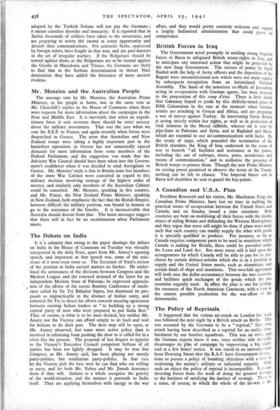The Debate on India
It is-a calamity that owing to the paper shortage the debate on India in the House of Commons on Tuesday was virtually unreported in the daily Press, apart from Mr. Amery's opening speech, and important as that speech was, some of the criti- cisms of it were even more so. The Secretary of State's review of the position in India carried matters no farther. He under- lined the seriousness of the divisions between Congress and the Moslem League, and the renewed demand of the latter for an independent Moslem State of Pakistan; he expressed apprecia- tion of the efforts of the recent Bombay Conference of mode- rates called by Sir Tej Bahadur Sapni, but dismissed its pro- posals as impracticable in the absence of Indian unity, and exhorted Sir Tej to direct his efforts towards securing agreement between existing Indian leaders or "to building up a strong central party of men who were prepared to put India first." That, of course, is what is to be most desired, but neither Mr. Amery nor the Viceroy can afford simply to sit back and wait for Indians to do their part. The door may still be open, as Mr. Amery observed, but some more active policy than is involved in refraining from pushing the door to is called for in a crisis like the present. The proposal of last August to appoint to the Viceroy's Executive Council competent Indians of all parties has been too lightly dropped. It may be true that Congress, as Mr. Amery said, has been playing not merely party-politics, but totalitarian party-politics. In that case let the Viceroy pick the best men he can find who are willing to serve, and let both Mr. Nehru and Mr. Jinnah denounce them if they will. Indians as a whole recognise the gravity of the world-situation, and the menace it portends to India itself. They are applying themselves with energy to the war effort, and they would pretty certainly welcome and support a largely Indianised administration that could prove its competence.


























 Previous page
Previous page